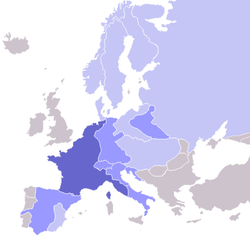First French Empire
| French Empire | ||||||||||||||||||||||
| Empire Français | ||||||||||||||||||||||
|
||||||||||||||||||||||
|
||||||||||||||||||||||
|
Anthem "Veillons au salut de l'Empire"' "Chant du départ" (de facto) (English: "Song of the Departure") "Marche consulaire" (English: "March of the Consulate") |
||||||||||||||||||||||
|
The French Empire and sphere of influence in 1811.
French Empire
French satellite states and occupied zones
Countries forced by France into the Continental System.
|
||||||||||||||||||||||
| Capital | Paris | |||||||||||||||||||||
| Languages |
French (official) Breton, Basque, Occitan, Picard, Franco-Provençal, Dutch, Serbo-Croat, Catalan, German, Italian |
|||||||||||||||||||||
| Religion | Roman Catholicism | |||||||||||||||||||||
| Government | Absolute Monarchy | |||||||||||||||||||||
| Emperor | ||||||||||||||||||||||
| • | 1804–1814/1815 | Napoleon I | ||||||||||||||||||||
| • | 1815 | Napoleon II | ||||||||||||||||||||
| Legislature | Parliament | |||||||||||||||||||||
| • | Upper house | Senate | ||||||||||||||||||||
| • | Lower house | Corps législatif | ||||||||||||||||||||
| Historical era | Napoleonic Wars
French Revolutionary Wars |
|||||||||||||||||||||
| • | Constitution adopted | 18 May 1804 | ||||||||||||||||||||
| • | Coronation of Napoleon I | 2 December 1804 | ||||||||||||||||||||
| • | Treaty of Tilsit | 7 July 1807 | ||||||||||||||||||||
| • | Invasion of Russia | 24 June 1812 | ||||||||||||||||||||
| • | Treaty of Fontainebleau | 11 April 1814 | ||||||||||||||||||||
| • | Hundred Days | 20 March – 7 July 1815 | ||||||||||||||||||||
| Area | ||||||||||||||||||||||
| • | 1813 | 2,100,000 km² (810,815 sq mi) | ||||||||||||||||||||
| Population | ||||||||||||||||||||||
| • | 1812 est. | 44,000,000 | ||||||||||||||||||||
| Currency | French franc | |||||||||||||||||||||
|
||||||||||||||||||||||
French Revolutionary Wars
The First French Empire (French: Empire Français), was the empire of Napoleon Bonaparte of France and the dominant power in much of continental Europe at the beginning of the 19th century. Its name was a misnomer, as France already had colonies overseas and was short lived compared to the Colonial Empire.
On 18 May 1804, Napoleon was granted the title Emperor of the French (L'Empereur des Français, pronounced: [lɑ̃.pʁœʁ dɛ fʁɑ̃.sɛ]) by the French Sénat and was crowned on 2 December 1804, ending the period of the French Consulate and of the French First Republic. The French Empire won early military victories in the War of the Third Coalition against Austria, Prussia, Russia, Portugal, and allied nations, notably at the Battle of Austerlitz in 1805 and, during the War of the Fourth Coalition, at the Battle of Friedland in 1807.
A series of wars, known collectively as the Napoleonic Wars, extended French influence over much of Western Europe and into Poland. At its height in 1812, the French Empire had 130 departments, ruled over 70 million subjects, maintained an extensive military presence in Germany, Italy, Spain, and the Duchy of Warsaw, and could count Prussia and Austria as nominal allies. Early French victories exported many ideological features of the French Revolution throughout Europe: the introduction of the Napoleonic Code throughout the continent increased legal equality, established jury systems and legalised divorce, and seigneurial dues and seigneurial justice were abolished, as were aristocratic privileges in all places with the exception of Poland.
...
Wikipedia



